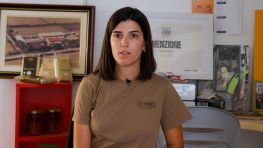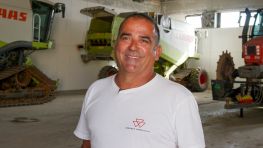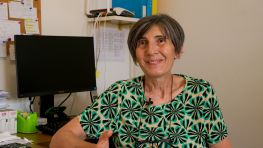 Rosalia Vacca and the Dream of…
Rosalia Vacca and the Dream of… Ugo Stocchi
The "bioveri" of Rovasenda.
Ugo Stocchi, born in 1978, is with his family one of the protagonists of the agricultural renewal of the Rovasenda community. Farmers for three generations, Ugo's grandfather and father have witnessed the radical change undergone by agriculture and the environment with the introduction of mechanization, landscape uniformization and the systematic use of synthetic chemicals. A transformation that has brought with it well-being and greater productivity but also the destruction of ecosystems, the loss of biodiversity, the ability of the earth to regenerate itself autonomously and above all an increase in the pollution of fundamental common goods such as water, air and land.
The constant observation of the negative effects brought by conventional agriculture led to the first experiments of organic farming in the early 2000s. Through a completely linear path, full of difficulties, failures and second thoughts, Ugo and his family developed a cultivation method rice totally free from the use of chemicals and based on a mix of elements. The dialogue with the local agricultural tradition, represented by those who still had the memory of ancient agronomic techniques, the careful observation of the paddy field, the research and experimentation of ancient varieties of rice are some of the pieces that make up what is defined as "green mulch. ".
Today the Stocchi di Rovasenda represent one of the references not only nationally for the cultivation, processing and sale of rice with genuinely natural techniques. Their enthusiasm has contaminated and influenced a large number of farmers in the area, generating the interest of both institutions and a large community of consumers. This success convinced them to increase their efforts and above all to give life to a subject like the "Biodistretto del Riso Piemonte", the first in Italy, to convey good practices and ferry them outside the local circle. The "Bioveri", as they like to define themselves, as opposed to the many who use the "Bio" label as a pass for the supermarket shelves with higher added value, are today a cohesive and strong group.
Video table of contents
- The father: from the disease the choice for the true organic.
- My life at the Cascina dell'Angelo.
- From traditional to conventional agriculture.
- The Macrobiotic Point, the need for economic sustainability.
- The first steps as organic farmers, the difficulties and the first successes.
- Today in Rovasenda over 1000 hectares of organic farming and the dream of "clean" agriculture.
- Thanks to consumers and their attention we can offer better food.
- A closed cycle company: cultivation, transformation, direct sales.
- The wishes of the people create the future.
- Effects on wildlife.
- The technique of green mulching and the historical memory of Rovasenda.
- Rice to cure: macrobiotics.
- The ancient varieties: more resistant in the field.
- The Macrobiotic Point Association and access to the germplasm bank.
- Consuming better, consuming less to make everyone eat: the limits of the "Green Revolution".
- Carnaroli: big, beautiful, white ... but without flavor!
- Rice is everyday food but risotto is that of the party!
- Risotto with nettles: the taste of memory.
Interview information
Country: IT
Region: Piemonte
City: Rovasenda
Urls: Cascina Una Garlanda
Ugo Stocchi
Date of birth: 03-11-1978
City: Gattinara
School: University
Profession: Farmer
Languages: Italiano
Document by: Luca Ghiardo
Video by: Luca Ghiardo
Created: 21-04-2021
Questo video fa parte del seguente archivio
Rice stories
Rice stories
Food is a fundamental resource for man and his health, both through the supply of nutrients and the ability to embody traits of human culture that play a leading role in our well-being.
Over time, each territory has built original ways in which to relate to the fruits of its land, enriching them with rituals, symbolic meanings and culinary customs. Much of these relationships have been lost following the years of the economic boom, with the exodus from the countryside to urban centers, with the advent of agriculture for mass production and ultimately with the globalization of markets and the consequent impoverishment of the heritage of biodiversity and ethnodiversity.
The purpose of this archive is to collect evidence relating to the main rice production area in Europe, that is the Po Valley, and to investigate, through the analysis of textual sources and testimonies collected in the field, both what survives of this heritage, and the ways in which which has evolved and reached us, paying particular attention to the explicit and implicit links that bind food and health.






